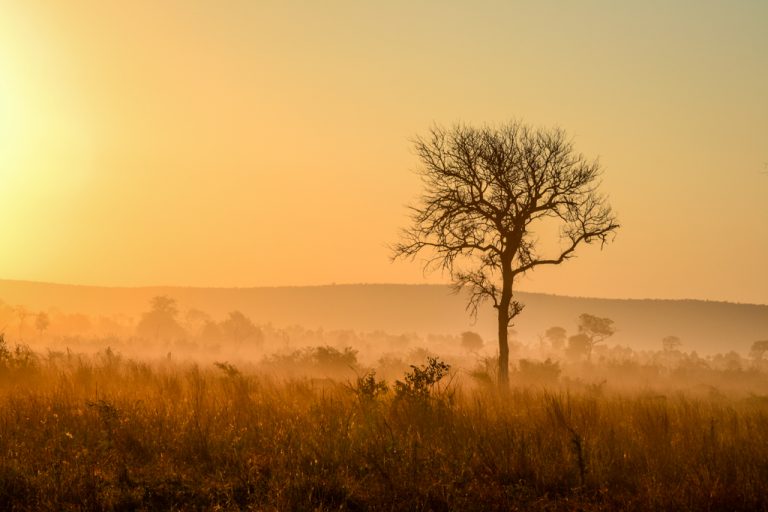
Imagine spending 18 days in the Kruger National Park? That’s what we did during May this year, staying in eight Kruger campsites on our way from north to south. If you’re thinking of doing it yourself, here’s our advice on the campsites you should book and the routes you simply can’t miss.

Early morning on a road near Crocodile Bridge Rest Camp.
Also read: See the best of Kruger National Park in a 7-day road trip
We wanted to cover as much ground as possible, so our itinerary was as follows: two nights at Punda Maria Rest Camp, two nights at Shingwedzi Camp, two nights at Tsendze Rustic Camp, one night at Sable Hide, two nights at Balule Satellite Camp, three nights at Satara Rest Camp, four nights at Skukuza Rest Camp and two nights at Crocodile Bridge.
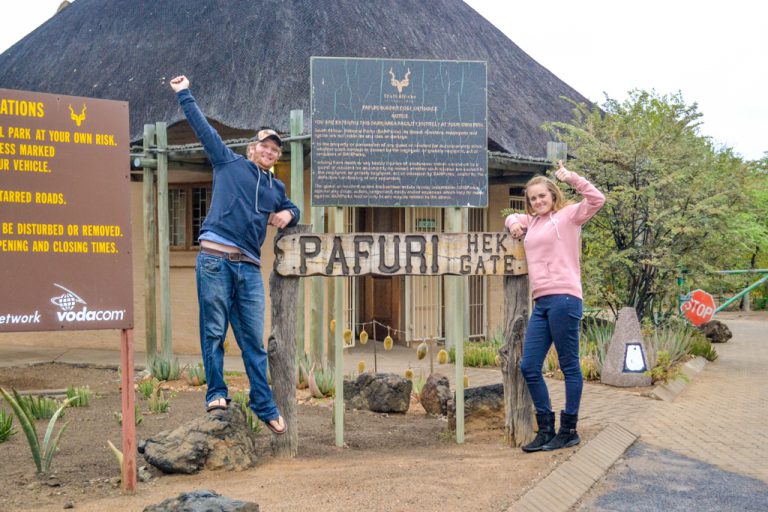
We left Johannesburg at 3am for our six-hour drive up to Pafuri Gate – the most northern gate of the Kruger National Park. Coming from a small city in the Eastern Cape, I was amazed at the beautiful baobabs all along the road going up north. After months of planning and a trailer full of supplies we made it!
Punda Maria Rest Camp
We had a good look around at the different camping spots at Punda Maria (as it works on a first come, first serve basis) and found a wonderful stand right next to the fence – our closest camping neighbours were 100 metres away.
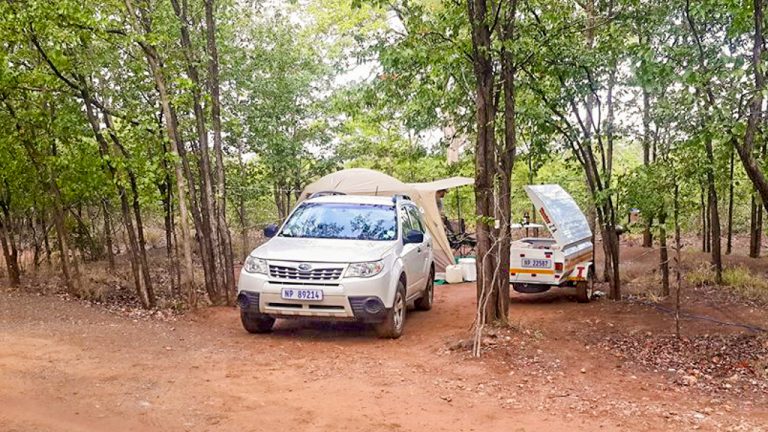
Our shaded site at Punda Maria Rest Camp.
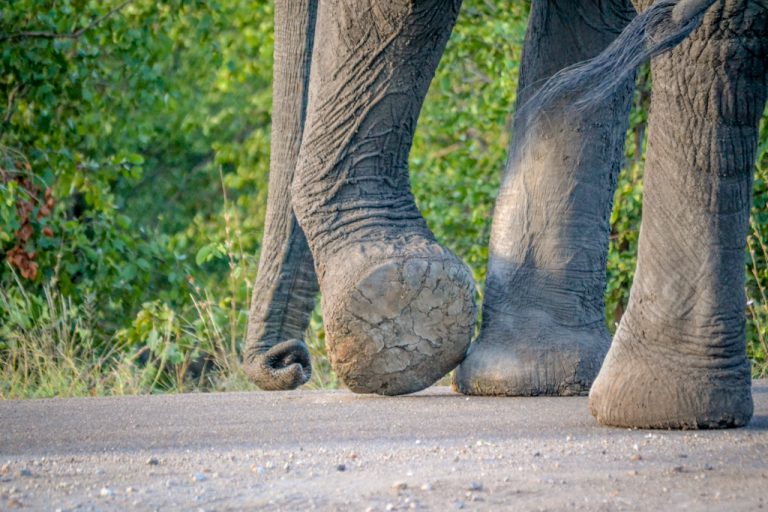
The crinkly underside of a well-padded elephant foot.
Tips for Punda Maria campsite
- You can NEVER have enough extension cords. We truly had the best campsite of all, having enough extension to camp at any distance and still have power!
- While you’re in this area you should visit the fever tree forest, which is close to the Pafuri port of entry into Mozambique (S63).
- Don’t miss the Mahonie Loop (S99), which is well known for leopard and lion sightings. It truly felt like paradise. You’re completely surrounded by lush big trees and an abundance of bird life. It’s not really suited to seeing the Big 5, but a wonderful place to completely get away from it all.
- We stopped at Babalala picnic spot, which was the cleanest picnic area (with the best ablutions) of all the sites we saw in the park.
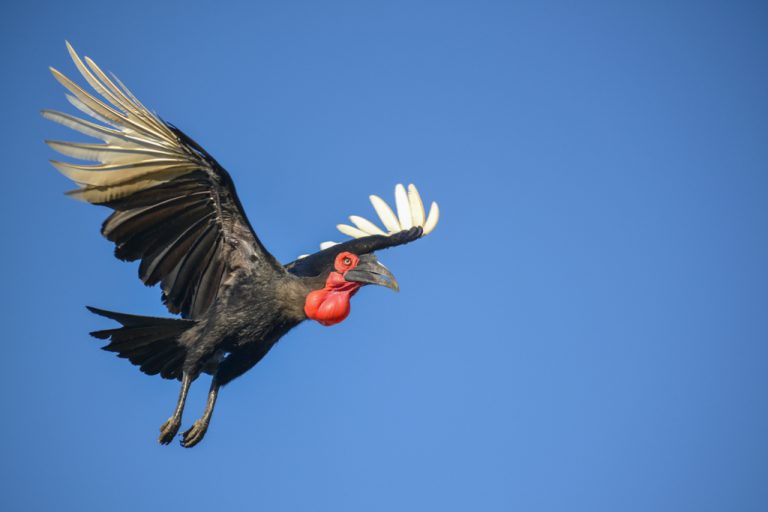
A ground hornbill in flight.
Shingwedzi Rest Camp
In the two days of travelling around Shingwedzi, we saw the elusive tsessebe antelope on the Old Main Road (S144). The campsites at Shingwedzi are quite nice, but it’s very dry and does not have many trees for shade. It does however have a lovely swimming pool to cool down in the summer months, and the day visitor area and restaurant overlooks the beautiful Shingwedzi River.
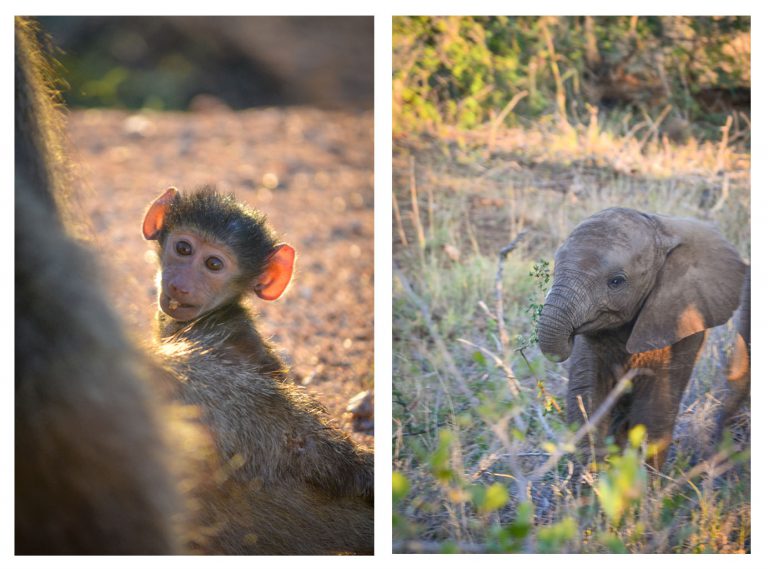
At this part of the park you can enjoy all the smaller parts of the park.
Tips for Shingwedzi campsite
- ‘Red Rocks’ on the S52 Road is one of best places to spot elephant, lion as well as leopard: it’s best to go there first thing in the morning to see animals drink water.
- Visit Tshanga Lookout just down the road, which overlooks a huge portion of Kruger.
Tsendze Rustic Camp
Amazing! This was our first time camping at this rustic campsite and it won’t be our last. Tsendze has no electricity, but offers a communal gas freezer. The ablutions operate on solar power and have lovely outdoor showers.
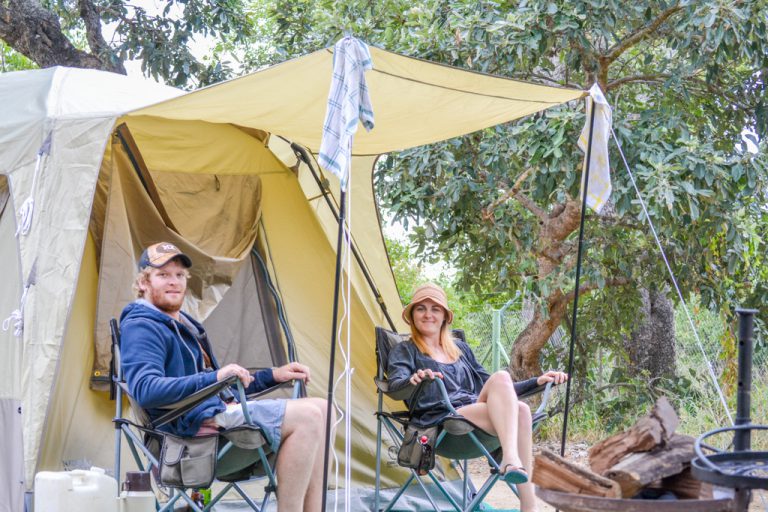
Settled into our spot at Tsendze Rustic Camp.
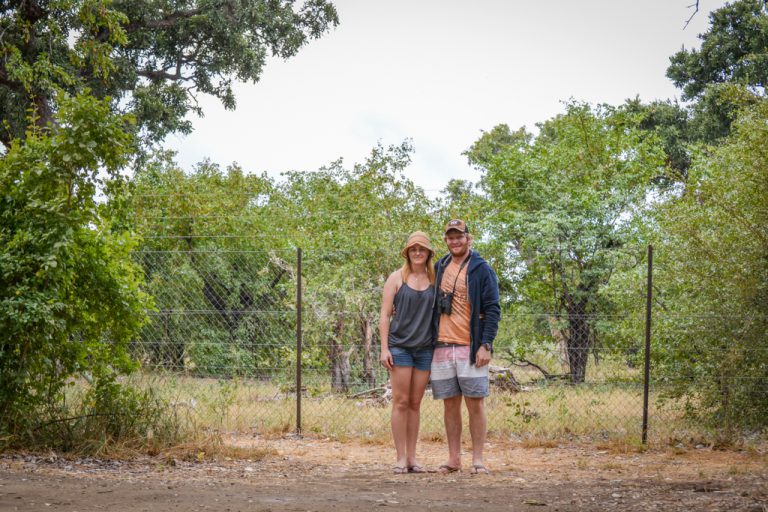
Here we stand right at the fence close to our camp site.
Tips for Tsendze Rustic Camp
- All the campsites are amongst beautiful trees making you feel completely isolated from the rest of the world: but campsites three, 26, 27 and 28 were the best. You can pre-book an allocated campsite by contacting Mopani reservations.
- The camp manager, Rodger Hobyane, is also known as the ‘Owl Man:’ ask him where to find the resident scops owls and African barred owlets.
- The Shongololo Loop (S142) and the Tropic of Capricorn Loop (S143) are both great roads to see sightings of elephant, buffalo and lion.
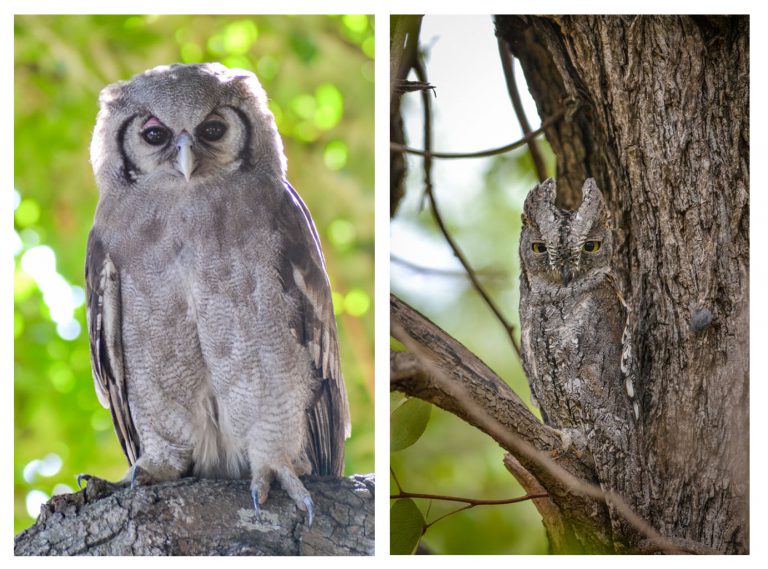
We were lucky enough a couple of owl species during our trip – including the Verreaux’s eagle owl on the left and the African scops owl on the right.
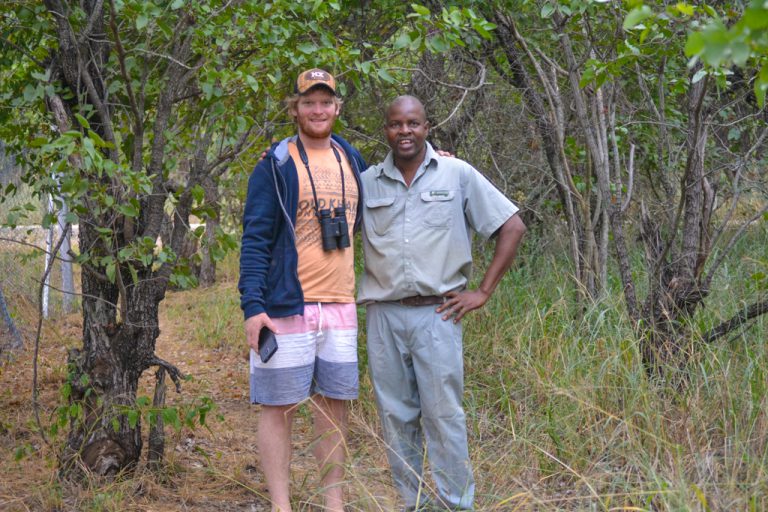
Here’s Jarryd with Rodger at Tsendze.
Sable Hide
Did you know you can sleep in a bird hide? There are two – Shipandani Hide and Sable Hide. We found that Sable Hide is prettier, more spacious and we could park our car in the boma area (at Shipandani you have to park outside). The hide overlooks the beautiful Sable Dam, home to many waterbirds, hippos and has occasional visitors like leopard, lion, elephants and buffalo.
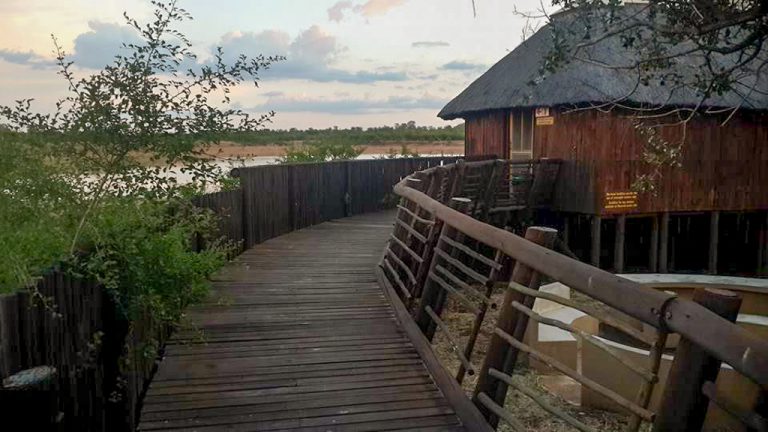
The ramp leading up the hide that overlooks Sable Dam.
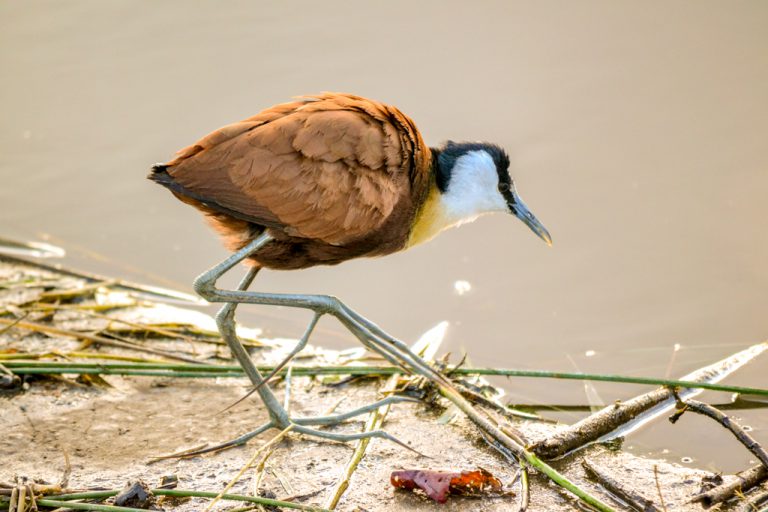
The African Jacana is just one of the birds Sable Hide provides an exclusive front row seat to when you spend the night.
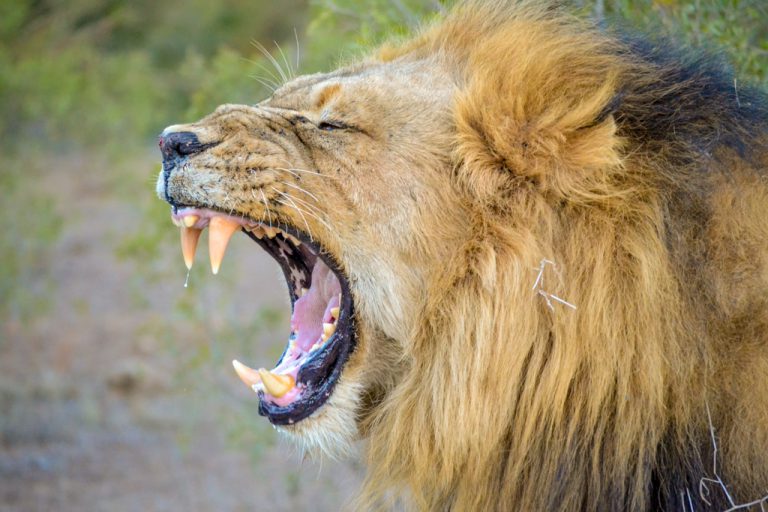
A lion shows off his impressive dental work.
Tips for Sable Hide
- It can only be booked telephonically through SANParks – it’s a little more expensive than the normal campsites, but so worth every cent.
- It can accommodate up to nine people at a time (you’ll have the whole place to yourself though, even if you’re just two).
Balule Satellite Camp
This scenic rustic camp is close to the main Olifants Rest Camp and right beside the Olifants River. The Balule campsite is clean, well maintained and all sites are offered on a first come, first serve basis. We travelled on the H8 from Olifants Camp and were lucky to find the elusive leopard, as well as buffalo, elephant, zebra and lots of different bird species. Balule is a lot like Tsendze also being quiet and so blissful and one really feels like you’re deep in the African bush.
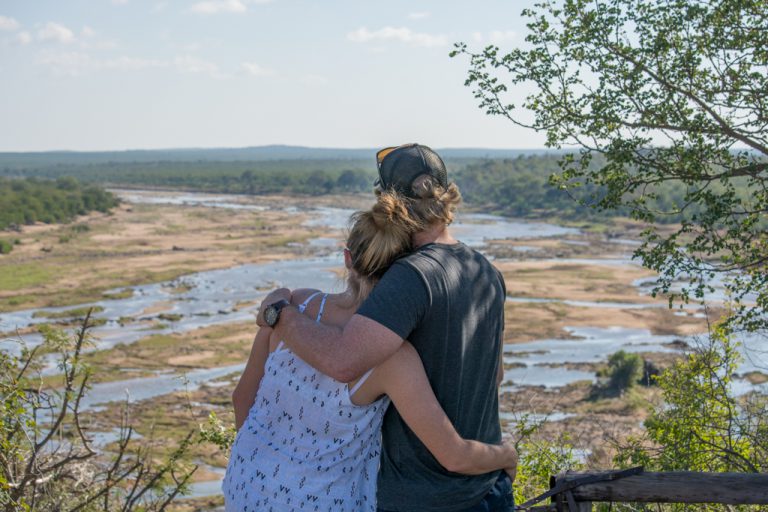
Checking out the Olifants River at a lookout point close to Balule.
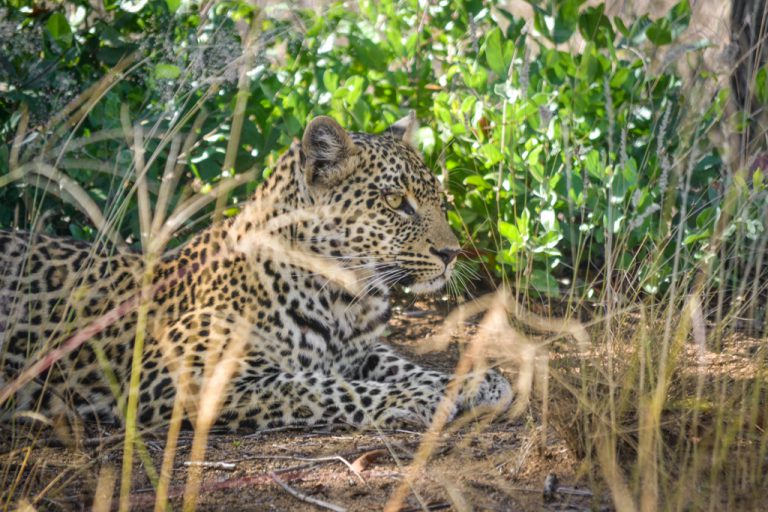
A small leopard lies under shady foliage.
Tips for Balule Rustic Camp
- We were lucky to get camp 11, which was right next to the fence and overlooked the water.
- Keep your eyes peeled for wild dogs: there’s a resident pack here, though we didn’t have any luck spotting them.
- I recommend the S89, S91 and S92 to see a variety of wildlife.
- There’s also a communal fridge and freezer and they make use of paraffin lamps in the ablutions for light.
Satara Rest Camp
For at least three months prior to our visit to the Kruger National Park, we were dreading what Satara and surroundings would look like because of the severe drought, but we were pleasantly surprised. We saw the Big 5 at least three times during our three days there! We thoroughly enjoyed our stay at Satara and it was one of our top three campsites during our stay at Kruger.
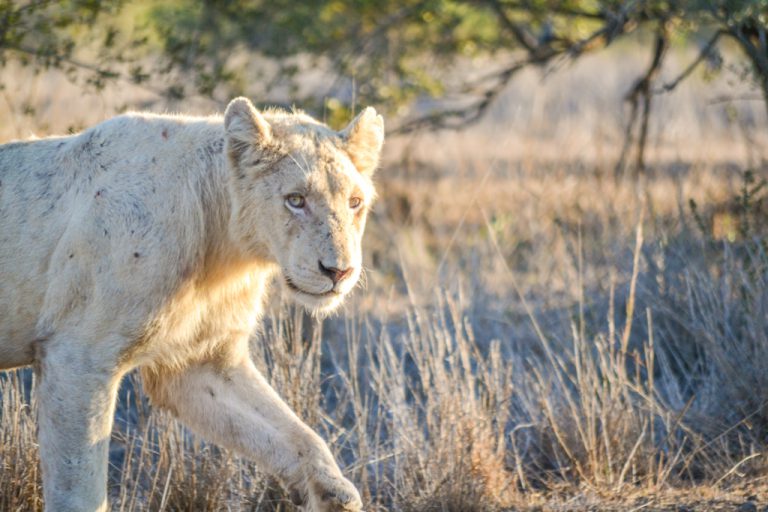
We were lucky enough to spot the only white lion in the park during our stay at Satara.
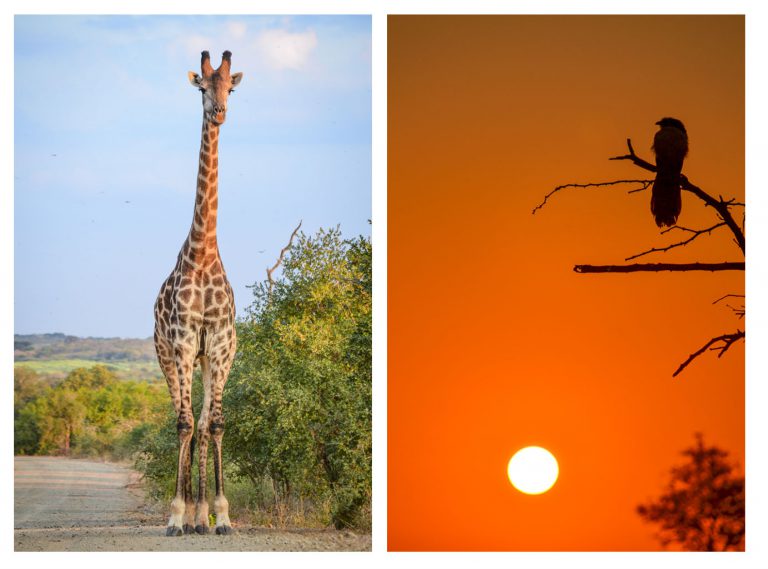
Some of the superb sights we had in the middle area of the park – a lonely giraffe in the morning light and my favourite, the Rain Bird, or Burchell’s coucal, at sunrise.
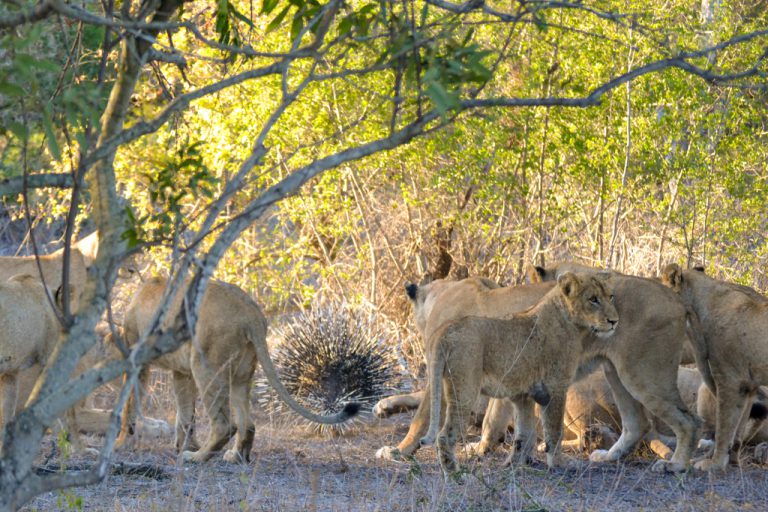
Here is the pride of lion, mostly cubs, that went after a porcupine.
Tips for Satara Rest Camp
- Do a sunset drive: you get half-daylight and half-night drive in one – and it’s not freezing! We went along the H1-3 to Kumana Dam and back, where we saw a beautiful lioness with nine cubs lying on the road; leopard, elephant, buffalo; and many nocturnal animals such as black-backed jackal, porcupine and bushbabies.
- I also recommend travelling on the H7 and surrounding roads for the best sightings.
- For lunch, either stop off at the scenic Timbavati Picnic Spot, which is always brimming with birds, or N’wanetsi Picnic spot, which has a lookout at the picnic spot.
- The S100 has always been the number one road to travel on to see a good variety of wildlife. We came across a big pride of lions here, including the only white male lion in the whole park.
Skukuza Rest Camp
Skukuza campsite is the hub of the park, a small Johannesburg if you will. It’s often full of foreign tourists that enter the park with the game vehicles from the surrounding private lodges that border the Kruger Park. The camping grounds were nice, but we were disappointed in many ways. For the first two nights we heard the singing and shouting of a staff party, there’s a large number of vehicles driving around at night (sometimes until 11 or 12) and we also had the misfortune of having campers next to us who partied for three days straight. All bad things aside, it was wonderful that my mom could fly into Skukuza Airport, which was so beautiful and the staff are all so friendly and happy to assist.
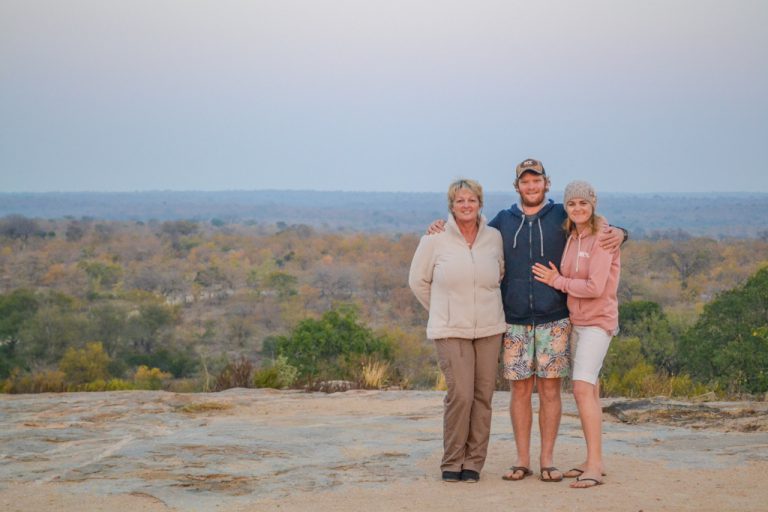
Standing on the granite domes so typical of the Skukuza area with my mom, who flew into Skukuza Airport.
Having my mom around as a first time visitor was wonderful, but we won’t hurry to stay at Skukuza again.
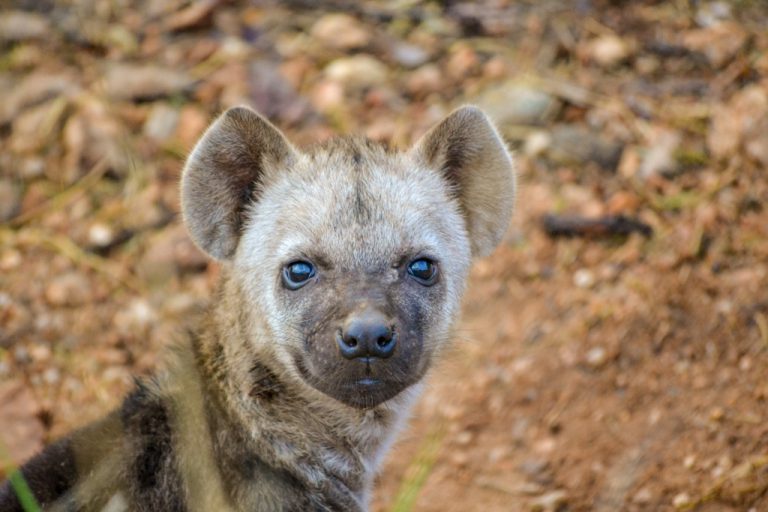
More puppy than scavenger this young hyena made our morning.
Tips for Skukuza
- The highlight of our stay at Skukuza was our early morning drive to Mathekanyane Lookout where we had a lovely cup of coffee with Ouma rusks, while watching the sunrise.
- We drove on many of the roads, but the river road (H4-1) towards Lower Sabie is the best for sightings. It’s like a highway as there’s plenty vehicle traffic, but still worth doing.
Crocodile Bridge Rest Camp
Crocodile Bridge has always been a favourite to us. It’s small, intimate, quiet and green – plus there’s the vast variety of wildlife. After 16 days of camping, we decided to stay in a safari tent. The campsite is beautiful and lovely, but we were so excited to sleep in a soft bed again. The tent had a braai stand outside and a fridge inside with fresh clean linen. One of the most popular roads is definitely the S28 where multiple sightings of leopard, lion, wild dog as well as cheetah have been reported. Another great road to take is the road to Duke’s Dam (S137) where a resident python has been seen eating an impala and a big pride of lions. On a previous visit we saw at least 37 lions at Duke’s Dam of which 19 were cubs.
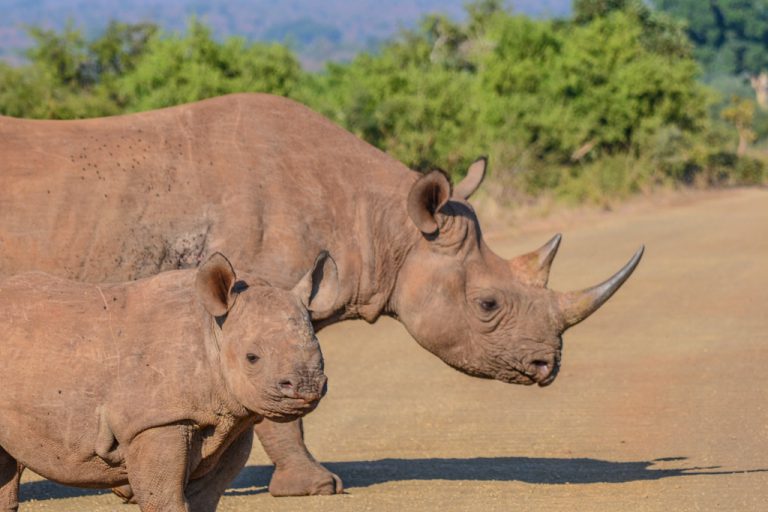
A pair of black rhino – mother and calf – crossed the road right in front of us.
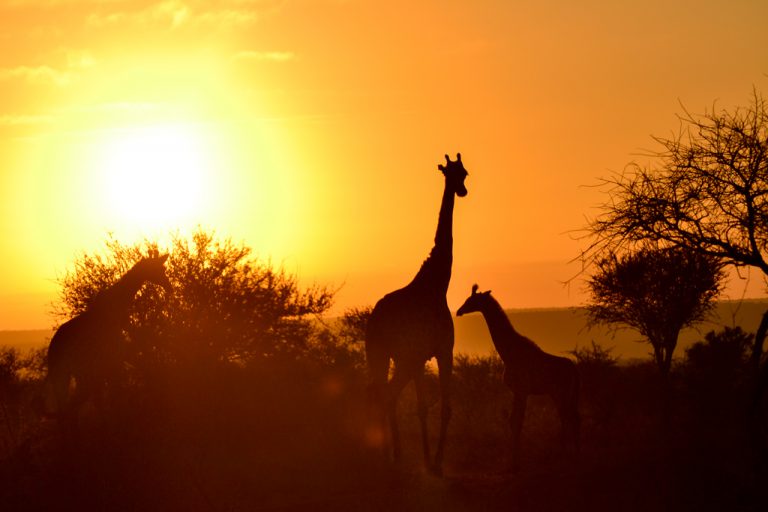
A pair of giraffe dance in the sunset.
Our advice for visiting Kruger
We had a wonderful 18 days in the Kruger National Park traveling from north to south. If anyone wants to do a trip like we have, we truly recommend staying at our five favourites: Tsendze, Sable Sleepover Hide, Balule, Satara and Crocodile Bridge. They are all different, in many ways, and it will be a trip to remember. If you are passionate campers like we are then I suggest staying at least three nights at each with the exception of Sable Hide. Make sure to pack in some long six-inch nails and washers instead of tent pegs – we’ve learnt after struggling to hit the pegs in to the hard ground and they’ve also come in handy for the braai stands that don’t have pins to adjust the level. We were very sad to leave Kruger and pass out over the Crocodile River back to reality, but it will most definitely not be our last trip.
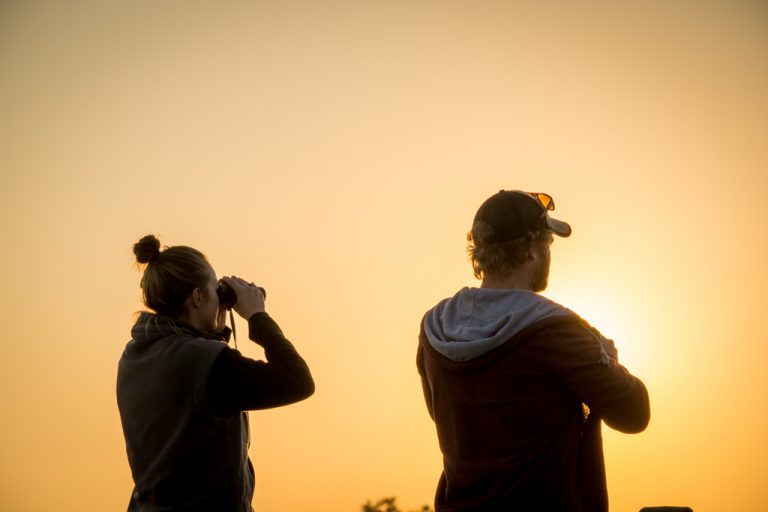
See you next time Kruger!
This article, The best Kruger campsites, north to south, was originally posted on the Getaway Blog by Madeleine van Heerden.